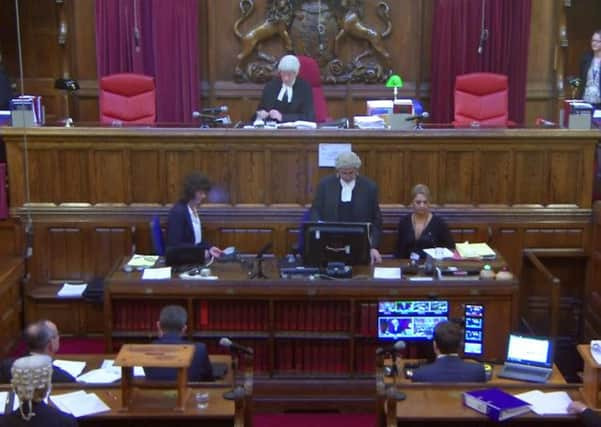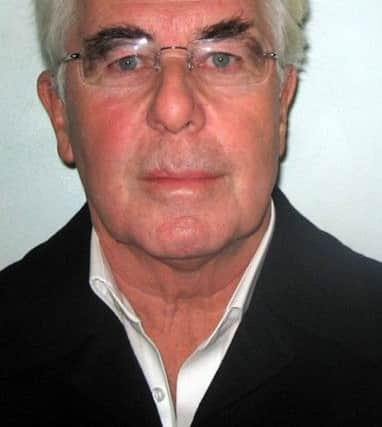Max Clifford loses appeal against eight-year jail term


The sentence was upheld by three Court of Appeal judges in London today.
Clifford, 71, was jailed in May after being convicted of a string of indecent assaults, carried out between 1977 and 1984, using his celebrity connections to lure women.
Advertisement
Hide AdAdvertisement
Hide AdThe former celebrity agent, who branded his accusers “fantasists”, denied the charges, but was convicted at London’s Southwark Crown Court.


Announcing the appeal court’s decision, Lord Justice Treacy, who heard the case with Mr Justice Turner and Judge Michael Pert, said the sentence was “justified”.
At a recent appeal hearing, Clifford’s barrister Richard Horwell QC told the three judges that Clifford’s last offence was committed 29 years ago, “since when he has led an industrious life, and devoted a considerable part of his time to charitable works for which he has raised substantial funds”.
The trial judge had “accepted that he is no longer a danger to women and that he will not commit further offences”.
Advertisement
Hide AdAdvertisement
Hide AdMr Horwell said that for a number of reasons the sentence imposed was “too long”, adding: “Although the sentencing process must reflect modern attitudes, and I fully accept that that is our law, the sentencing process must not abandon common sense and fairness.”
Rosina Cottage QC, for the Crown, said the total sentence imposed was one the trial judge was “entitled to reach”.
When sentencing Clifford, Judge Anthony Leonard told him his personality and position in the public eye were the reasons his crimes were not revealed earlier.
He said: “The reason why they were not brought to light sooner was because of your own dominant character and your position in the world of entertainment which meant that your victims thought that you were untouchable, something that I think you too believed.”
Advertisement
Hide AdAdvertisement
Hide AdHe added: “These offences may have taken place a long time ago, when inappropriate and trivial sexual behaviour was more likely to be tolerated, but your offending was not trivial, but of a very serious nature.”
Clifford is currently serving his sentence at Littlehey Category C men’s prison in Cambridgeshire.
Announcing the court’s decision today, Lord Justice Treacy said: “It seems to us that, after consideration of the individual offences and the application of modern sentencing attitudes reflected in the guidelines, but tempered by the need to have regard to the statutory maximum available at the time, an overall sentence of eight years was justified and correct.”
It was a “just and proportionate” sentence “taking account of considerations of harm and culpability together with aggravating factors and such mitigation as was available to the appellant”.
Advertisement
Hide AdAdvertisement
Hide AdLord Justice Treacy said Clifford was sentenced to a total of eight years on eight counts of indecent assault relating to four victims who were “young and vulnerable” at the time of the offences.
He said: “Each was affected in respect of confidence and relationships and was harmed by what had been done to her.”
In considering the seriousness of any offence the court “must consider the offender’s culpability and any harm which the offence caused”.
The judge said: “Sexual offending will by its very nature cause harm at the time the offence is committed, but it is well recognised that for many victims significant harm persists for a considerable period afterwards.
Advertisement
Hide AdAdvertisement
Hide Ad“This is a case where it is clear that the effect of what was done to the victims was not something from which they recovered quickly.
“The appellant’s actions towards these victims had long term consequences for their lives. This is clearly a highly material circumstance for this court to consider.”
The judge said Clifford’s offending involved “an abuse of a powerful position coupled with deceit”.
There had been a “gross abuse of power and influence”.
Four girls or young women were involved, one under the age of 16.
Advertisement
Hide AdAdvertisement
Hide AdLord Justice Treacy said the offending took place over a period of several years and there was a significant age difference between Clifford and his victims - at the time he would have been in his mid-30s to early 40s.
He had never been convicted of any other criminal offence “and the trial did not reveal any other evidence of sexual offending after the period with which the counts were concerned”.
The judge said: “Thus, there was a period of nearly 30 years without further offending before these matters came to court and the appellant was convicted.”
He added: “Over that period there was evidence before the judge of a positive nature showing involvement in a variety of charitable works which the appellant had not publicised. The judge also had a number of positive character references.”
Advertisement
Hide AdAdvertisement
Hide AdLord Justice Treacy went on: “It is clear, however, that over the period of offending, these young women were targeted by the appellant who actively misled them and exploited their desire to succeed in their careers for his own purposes.
“The appellant was a dominant personality and in a powerful position within the world of entertainment and media.
“This enabled him to do what he did and to convince the victims that there was no point in complaining because no one would listen to them.
“He was thus able to lead a double life, progressing in his career, whilst his victims, affected by what he had done to them, felt powerless to complain.”
The judge said Clifford had “lost potential credit by contesting the trial and in addition lost potential mitigation as he showed no remorse at any stage for what he had done”.